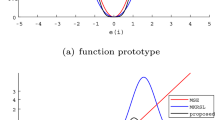Abstract
In this work we combine the kernel method and the generalized half-quadratic criterion, and a kernel adaptive filtering algorithm is proposed based on the generalized half-quadratic criterion (KLGHQC). The generalized half-quadratic criterion (GHQC) guarantees the stability of the algorithm under the environment of the stable distribution noise, and the shape of the GHQC performance surface is determined by a constant, which improves the rate of convergence of the algorithm. Finally, the simulated results in two environments, Mackey–Glass sequence prediction and non-linear system identification. The outcome demonstrates that the KLGHQC algorithm proposed in this research outperforms other kernel filtering algorithms in the filtering accuracy and error magnitude.








Similar content being viewed by others
Data availability
All data generated or analyzed during this study are included in this article. Data sharing is not applicable to this article as no datasets were generated or analyzed during the current study.
References
Julier, S.J., Uhlmann, J.K.: Unscented filtering and nonlinear estimation[J]. Proc. IEEE 92(3), 401–422 (2004)
Skretting, K., Engan, K.: Recursive least squares dictionary learning algorithm[J]. IEEE Trans. Signal Process. 58(4), 2121–2130 (2010)
Widrow, B., Walach, E.: Adaptive signal processing for adaptive control[J]. IFAC Proc. Vol. 16(9), 7–12 (1983)
Dong, R., Wang, S.: New optimization algorithm inspired by kernel tricks for the economic emission dispatch problem with valve point[J]. IEEE Access 8, 16584–16594 (2020)
Cheng, F., Chu, F., Xu, Y., et al.: A steering-matrix-based multiobjective evolutionary algorithm for high-dimensional feature selection[J]. IEEE Trans. Cybern. 52(9), 9695–9708 (2021)
Pauline, S.H., Samiappan, D., Kumar, R., et al.: Variable tap-length non-parametric variable step-size NLMS adaptive filtering algorithm for acoustic echo cancellation[J]. Appl. Acoust. 159, 107074 (2020)
Wang, J., Ji, Y., Zhang, X., et al.: Two-stage gradient-based iterative algorithms for the fractional-order nonlinear systems by using the hierarchical identification principle[J]. Int. J. Adapt. Control Signal Process. 36(7), 1778–1796 (2022)
Antoniadis, A., Paparoditis, E., Sapatinas, T.: A functional wavelet-kernel approach for time series prediction[J]. J. R. Stat. Soc. Ser. B Stat Methodol. 68(5), 837–857 (2006)
Wu, Q., Li, Y., Xue, W.: A kernel recursive maximum versoria-like criterion algorithm for nonlinear channel equalization[J]. Symmetry 11(9), 1067 (2019)
Wang, H., Li, X., Bi, D., et al.: A robust student’s t-based kernel adaptive filter[J]. IEEE Trans. Circuits Syst. II Express Briefs 68(10), 3371–3375 (2021)
Han, M., Zhang, S., Xu, M., et al.: Multivariate chaotic time series online prediction based on improved kernel recursive least squares algorithm[J]. IEEE Trans. Cybern. 49(4), 1160–1172 (2018)
Zhao, S., Chen, B., Principe, J.C.: Kernel adaptive filtering with maximum correntropy criterion[C]. in The 2011 International Joint Conference on Neural Networks. IEEE, pp. 2012-2017 (2011)
Dong, Q., Lin, Y.: Kernel fraction low power adaptive filtering algorithm against impulse noise[J]. Comput. Sci. 46, 80–82 (2019)
Yuan-Lian, H., Dan-Feng, W., **ao-Qiang, L., et al.: Kernel adaptive filtering algorithm based on Softplus function under non-Gaussian impulse interference[J]. Acta Phys. Sin. 70(2), 028401 (2021)
Yuan-Lian, H., Li-Hua, T., Yong-Feng, Q., et al.: Quantized kernel least inverse hyperbolic sine adaptive filtering algorithm[J]. Acta Phys. Sin 71(22), 228401 (2022)
Santamaria, I.: Kernel adaptive filtering: a comprehensive introduction [Book Review][J]. IEEE Comput. Intell. Mag. 5(3), 52–55 (2010)
Patel, V., Bhattacharjee, S.S., Christensen, M.G.: Generalized soft-root-sign based robust sparsity-aware adaptive filters[J]. IEEE Signal Process. Lett. 30, 200–204 (2023)
Kumar, K., Pandey, R., Bhattacharjee, S.S., et al.: Exponential hyperbolic cosine robust adaptive filters for audio signal processing[J]. IEEE Signal Process. Lett. 28, 1410–1414 (2021)
Kumar, K., Bhattacharjee, S.S., George, N.V.: Modified Champernowne function based robust and sparsity-aware adaptive filters[J]. IEEE Trans. Circuits Syst. II Express Briefs 68(6), 2202–2206 (2020)
Steinwart, I., Scovel, C.: Mercer’s theorem on general domains: on the interaction between measures, kernels, and RKHSs[J]. Constr. Approx. 35, 363–417 (2012)
Aronszajn, N.: Theory of reproducing kernels[J]. Trans. Am. Math. Soc. 68(3), 337–404 (1950)
Sadigh, A.N., Yazdi, H.S., Harati, A.: Convergence and performance analysis of kernel regularized robust recursive least squares[J]. ISA Trans. 105, 396–405 (2020)
Colding, T.H., Minicozzi, W.P.: A course in minimal surfaces[M]. American Mathematical Soc, Providence (2011)
Zhang, N., Ni, J., Chen, J., Li, Z.: Steady-state mean-square error performance analysis of the tensor LMS algorithm. IEEE Trans. Circuit Syst. II Expr. Brief 68(3), 1043–1047 (2020)
Author information
Authors and Affiliations
Contributions
Yuanlian Huo performed the verification of the experimental designand graphing; Zikang Luo performed the first draft writing and investigation; and Liu Jie do the technique analysis.
Corresponding author
Ethics declarations
Conflict of interest
The authors declare that they have no conflict of interest.
Additional information
Publisher's Note
Springer Nature remains neutral with regard to jurisdictional claims in published maps and institutional affiliations.
Rights and permissions
Springer Nature or its licensor (e.g. a society or other partner) holds exclusive rights to this article under a publishing agreement with the author(s) or other rightsholder(s); author self-archiving of the accepted manuscript version of this article is solely governed by the terms of such publishing agreement and applicable law.
About this article
Cite this article
Huo, Y., Luo, Z. & Liu, J. A novel kernel filtering algorithm based on the generalized half-quadratic criterion. SIViP (2024). https://doi.org/10.1007/s11760-024-03394-9
Received:
Revised:
Accepted:
Published:
DOI: https://doi.org/10.1007/s11760-024-03394-9




